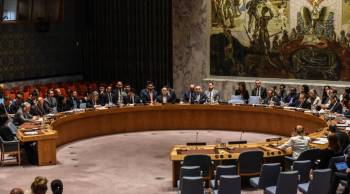Adriene Hill: We start with the global perspective on business and economics. Today, North Korea, which has reached a deal with the U.S. to suspend its nuclear program in exchange for U.S. food aid. Because of sanctions, the U.S. hasn’t sent food to North Korea since 2009, despite reports of significant malnutrition in the country.
For more we go to the BBC’s Lucy Williamson in South Korea. Good morning.
Lucy Williamson: Good morning.
Hill: So as part of the deal, the U.S. has released hundreds of million of pounds in food aid to North Korea. How significant is that to the people living there?
Williamson: It depends who they reach, is the short answer. And one of the things that’s help up that food aid from the American point of view is ensuring they can get proper access to monitor where it’s going. They’re worried any food they give North Korea may be diverted to feed the enormous army they have there — and not go to the people who, we are told by aid agencies, are severely malnourished in some parts of the country.
Hill: Now are there any provisions in place to make sure the food gets to the right people?
Williamson: The U.S. aid department is saying that they have got assurances that their monitors will be able to get to have the access they need; that’s of course a hugely wide open question. I mean, this takes us to a situation where you’ve got a broad agreement between North Korea and the U.S. about what will happen. But you don’t have much of the nitty-gritty fleshed out yet, and that’s where a lot of these agreements fall down. I mean certainly, much larger deals than this one have been suffered by the detail.
Hill: How big a deal is this agreement to U.S. relations in Asia broadly?
Williamson: The U.S.-North Korea relationship is at the center of a lot of what goes on here, and this agreement gets us to the starting line, if you like; there’s a real turnaround in where we were. But it is at a starting line, it’s like everyone’s gone back in their car and they’re staring down the road. But there’s a long road to go, and as they say, lots of things could trip this up along the way.
Hill: The BBC’s Lucy Williamson, thanks.
Williamson: Thanks.
There’s a lot happening in the world. Through it all, Marketplace is here for you.
You rely on Marketplace to break down the world’s events and tell you how it affects you in a fact-based, approachable way. We rely on your financial support to keep making that possible.
Your donation today powers the independent journalism that you rely on. For just $5/month, you can help sustain Marketplace so we can keep reporting on the things that matter to you.


















